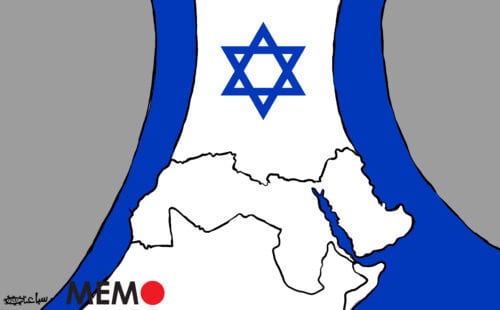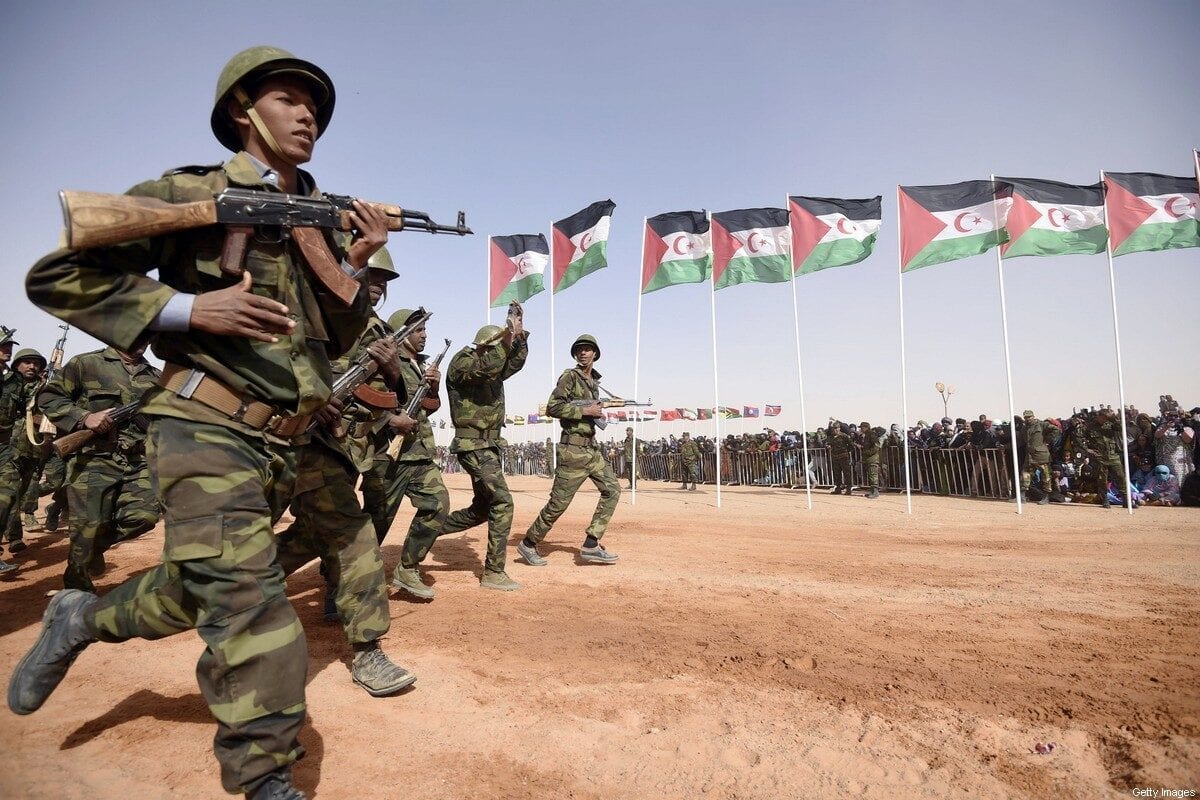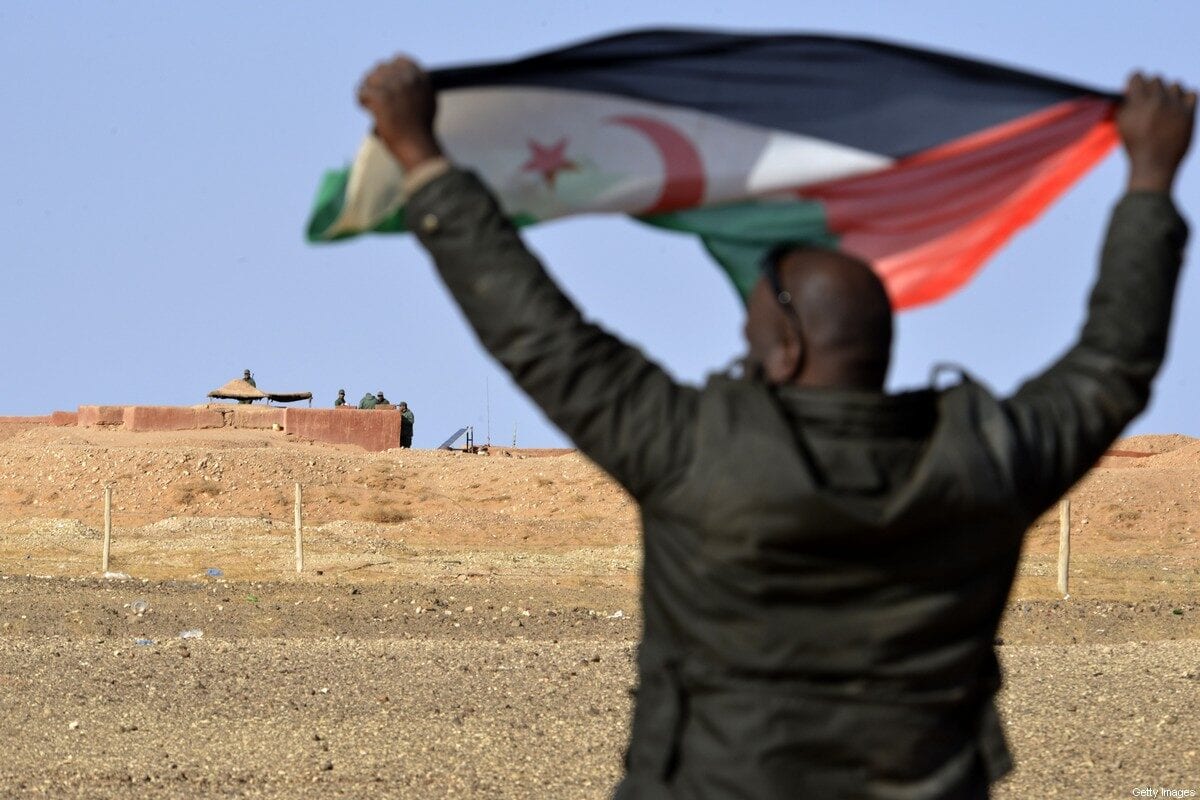Algerian parties have criticised the tripartite agreement between Morocco, the US and Israel, considering it a political, diplomatic and ethical stain.
Meanwhile, the Moroccan people have expressed their rejection of normalisation through their mass protests and various efforts to hinder this step.
In a statement published on Facebook, the National Liberation Front (FLN) confirmed that it had: "Angrily denounced and condemned the announcement made by the Kingdom of Morocco regarding the establishment of diplomatic relations with the usurping Zionist entity, in exchange for the recognition of the US president of Morocco's alleged sovereignty over occupied Western Sahara."
The statement added: "The most remarkable part of the humiliating and shameful agreement that traded the nation's honour, is that it coincided with Human Rights Day (10 December)."

A growing number of countries in the MENA region are normalising ties with Israel –
In a statement published on Facebook, the National Liberation Front (FLN) confirmed that it had: "Angrily denounced and condemned the announcement made by the Kingdom of Morocco regarding the establishment of diplomatic relations with the usurping Zionist entity, in exchange for the recognition of the US president of Morocco's alleged sovereignty over occupied Western Sahara."
The statement added: "The most remarkable part of the humiliating and shameful agreement that traded the nation's honour, is that it coincided with Human Rights Day (10 December)."

A growing number of countries in the MENA region are normalising ties with Israel –
Cartoon [Sabaaneh/MiddleEastMonitor]
The statement considered that: "Giving up the inalienable right of the Palestinian people in exchange for obtaining an illusory sovereignty over occupied Western Sahara is humiliating. It will remain a political, diplomatic and ethical stain on the forehead of the involved parties who have always bragged about supporting the Palestinian cause. Today, the truth is revealed after agreeing to sell the sacred cause based on a deceitful and fake tweet published in the last moment. It is a gift from the have-nots to the unworthy."
The FNL stressed that it: "Renews its commitment, on this perfidious occasion, to continue its support for the Palestinian cause until victory is achieved in order to establish an independent state with Al-Quds as its capital."
READ: Morocco-Israel normalisation is a slap in the face of the African Union
The party also reiterated its support for the rights of the Saharawi people in their struggle and resistance until the implementation of the international legitimacy resolutions, as well as holding a referendum on self-rule to decide the fate of the people of Western Sahara.
Head of the Movement for the Society of Peace Abderrazak Makri posted on Facebook: "The Moroccan regime did not decide to normalise only today, and anyone who knows the complications of the Palestinian cause will be aware of the old hidden and uncovered paths of normalisation between Morocco and the Zionist entity."
The leader of Algeria's largest Islamic party drew a distinction between the position of the Moroccan state and that of the Moroccan people, stating: "We are aware of the efforts made by the Moroccan people to reject normalisation through their mass protests and varied efforts in this regard, and they will not be disappointed by Allah's will."
As a sign of solidarity with the Justice and Development Party that leads the Moroccan government, Makri expressed: "What will the affected party (the Justice and Development Party) in this case do? We ask Allah to help them handle the situation. Regardless of existing infiltrations of the Arab regimes that have inherited the honour of defending the Palestinian cause through national struggles and movements, but have abandoned it, the peoples of the region will remain faithful until the storm passes thanks to our steadfast values of Islam and the spirit of our nation that stands as our defence in difficult times."
Makri added: "The struggle continues, and by Allah's will, some will be humiliated and others will be honoured."
The head of the Movement of Society for Peace seized the opportunity to call on the Algerians to preserve: "National cohesion to avoid the greed of conspirators."
The statement considered that: "Giving up the inalienable right of the Palestinian people in exchange for obtaining an illusory sovereignty over occupied Western Sahara is humiliating. It will remain a political, diplomatic and ethical stain on the forehead of the involved parties who have always bragged about supporting the Palestinian cause. Today, the truth is revealed after agreeing to sell the sacred cause based on a deceitful and fake tweet published in the last moment. It is a gift from the have-nots to the unworthy."
The FNL stressed that it: "Renews its commitment, on this perfidious occasion, to continue its support for the Palestinian cause until victory is achieved in order to establish an independent state with Al-Quds as its capital."
READ: Morocco-Israel normalisation is a slap in the face of the African Union
The party also reiterated its support for the rights of the Saharawi people in their struggle and resistance until the implementation of the international legitimacy resolutions, as well as holding a referendum on self-rule to decide the fate of the people of Western Sahara.
Head of the Movement for the Society of Peace Abderrazak Makri posted on Facebook: "The Moroccan regime did not decide to normalise only today, and anyone who knows the complications of the Palestinian cause will be aware of the old hidden and uncovered paths of normalisation between Morocco and the Zionist entity."
The leader of Algeria's largest Islamic party drew a distinction between the position of the Moroccan state and that of the Moroccan people, stating: "We are aware of the efforts made by the Moroccan people to reject normalisation through their mass protests and varied efforts in this regard, and they will not be disappointed by Allah's will."
As a sign of solidarity with the Justice and Development Party that leads the Moroccan government, Makri expressed: "What will the affected party (the Justice and Development Party) in this case do? We ask Allah to help them handle the situation. Regardless of existing infiltrations of the Arab regimes that have inherited the honour of defending the Palestinian cause through national struggles and movements, but have abandoned it, the peoples of the region will remain faithful until the storm passes thanks to our steadfast values of Islam and the spirit of our nation that stands as our defence in difficult times."
Makri added: "The struggle continues, and by Allah's will, some will be humiliated and others will be honoured."
The head of the Movement of Society for Peace seized the opportunity to call on the Algerians to preserve: "National cohesion to avoid the greed of conspirators."
Polisario ambassador to Algeria: 'Trump agreement with Rabat and Tel Aviv is null and void'
December 12, 2020

Members of the Sahrawi People's Liberation Army parade during a ceremony to mark 40 years after the Front proclaimed the Sahrawi Arab Democratic Republic (SADR) in the disputed territory of Western Sahara on February 27, 2016 [FAROUK BATICHE/AFP via Getty Images]
Demonstrations of the Sahrawi people and supporters in the Spanish capital, Madrid against Rabat's policy
Ambassador of the Popular Front for the Liberation of Saguia El-Hamra and Río de Oro (Polisario Front), Abdelkader Taleb Omar, declared that Trump's agreement with Rabat and Tel Aviv is null, lacks legitimacy, and violates the United Nations (UN) resolutions.]
In his statement to the official Algerian news agency, the Sahrawi ambassador stressed that this agreement: "Will not affect the determination of the Sahrawis in their struggle for their cause." Omar explained that Trump does not have the right to control sovereignty over the disputed land, and that: "Only the Sahrawi people have the right to decide on the matter."
Omar confirmed that the partners in the agreement: "Are doing business, usurping the rights of people and trading with the blood of the Palestinian and Saharawi peoples", while confirming that this deal "will never succeed," given that Trump is about to leave the White House.
The Sahrawi ambassador indicated that the outgoing US president who: "Denies the rights of the Saharawi people is acting individually," and that his move "does not express the position of the new US administration," while comparing Trump's position with his rejection of the results of the presidential elections in his country.
The Sahrawi official asserted: "This agreement is nothing but a summer cloud that will evaporate after Trump's departure from the White House," recalling the UN's clear position on the Western Sahara issue.
December 12, 2020

Members of the Sahrawi People's Liberation Army parade during a ceremony to mark 40 years after the Front proclaimed the Sahrawi Arab Democratic Republic (SADR) in the disputed territory of Western Sahara on February 27, 2016 [FAROUK BATICHE/AFP via Getty Images]
Demonstrations of the Sahrawi people and supporters in the Spanish capital, Madrid against Rabat's policy
Ambassador of the Popular Front for the Liberation of Saguia El-Hamra and Río de Oro (Polisario Front), Abdelkader Taleb Omar, declared that Trump's agreement with Rabat and Tel Aviv is null, lacks legitimacy, and violates the United Nations (UN) resolutions.]
In his statement to the official Algerian news agency, the Sahrawi ambassador stressed that this agreement: "Will not affect the determination of the Sahrawis in their struggle for their cause." Omar explained that Trump does not have the right to control sovereignty over the disputed land, and that: "Only the Sahrawi people have the right to decide on the matter."
Omar confirmed that the partners in the agreement: "Are doing business, usurping the rights of people and trading with the blood of the Palestinian and Saharawi peoples", while confirming that this deal "will never succeed," given that Trump is about to leave the White House.
The Sahrawi ambassador indicated that the outgoing US president who: "Denies the rights of the Saharawi people is acting individually," and that his move "does not express the position of the new US administration," while comparing Trump's position with his rejection of the results of the presidential elections in his country.
The Sahrawi official asserted: "This agreement is nothing but a summer cloud that will evaporate after Trump's departure from the White House," recalling the UN's clear position on the Western Sahara issue.
December 12, 2020

A Saharawi man holds up a Polisario Front flag near Moroccan soldiers guarding the wall separating the Polisario controlled Western Sahara from Morocco on 3 February 2017 [STRINGER/AFP via Getty Images]
December 12, 2020
Israel and Moroccan Jews on Friday celebrated an agreement to normalise relations between the two countries, but the largest party in Morocco's government faced internal wrangling over a move that some Moroccans regard as a betrayal of Palestinians.
The US-brokered deal – the fourth such "normalisation" announcement involving an Arab country and Israel in as many months – also drew criticism from Moscow.
A core element of the deal brokered by President Donald Trump was US recognition of Morocco's claim to sovereignty over Western Sahara. A decades-old territorial dispute has pitted Morocco against the Algeria-backed Polisario Front, which seeks to establish an independent state.
Russia's foreign ministry said the US decision to recognise Moroccan sovereignty was a breach of international law, the RIA news agency reported.
Winning global support for its claim over Western Sahara is Morocco's most important foreign policy goal. It has also often pursued a more open stance towards Israel and Israelis of Moroccan descent than have other Arab states.
Moroccan Foreign Minister Nasser Bourita said on Thursday that King Mohammed VI has pursued a US shift in its Western Sahara policy for three years, forging close ties with Trump's son-in-law and senior adviser, Jared Kushner.
But while the king has the final say on foreign policy, the moderate Islamist PJD – which gained the most seats in a 2016 election – did not appear wholly united on the announcement about Israel.
OPINION: Morocco-Israel normalisation is a slap in the face of the African Union
In a debate late on Thursday after the deal was announced, disagreements emerged among senior party leaders, according to one member who was present. Nearly a full day later, on Friday, the party had still not commented on the deal, long after its main coalition partners had welcomed the move.
Morocco was home to a large Jewish community before Israel was founded in 1948, and around 3,000 Jews still live there.
Around 50,000 Israelis travel to Morocco each year to visit religious sites and other tourist attractions, but there are no direct flights and tourists undergo a lengthy process to obtain visas.
Suzanne Harroch, a Moroccan Jewish singer from Rabat, said the new arrangement would bring her closer to her relatives in Israel.
"The history of the Jews in Morocco dates back 3,000 years. This history was interrupted, but now with this decision normalcy will be restored," she said.
No comments:
Post a Comment